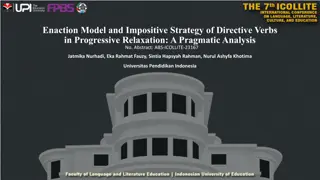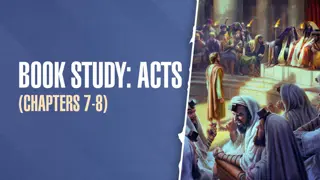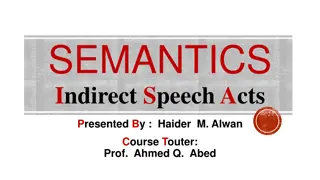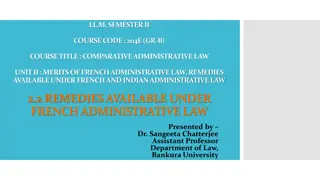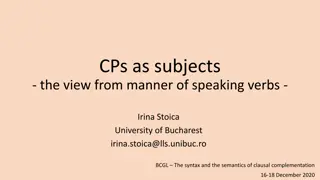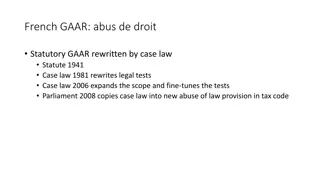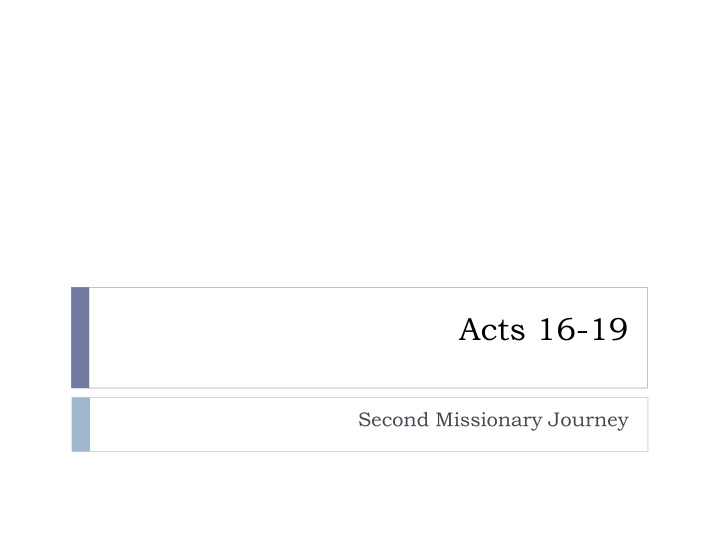
Insights from Acts 16-19: Second Missionary Journey and Divine Guidance
Explore key events from Acts 16-19, including Timothy's circumcision, the Macedonian Call, Lydia's conversion, and the riot in Philippi. Discover valuable lessons on cultural sensitivity, following divine guidance, and the power of the Gospel in challenging situations.
Download Presentation

Please find below an Image/Link to download the presentation.
The content on the website is provided AS IS for your information and personal use only. It may not be sold, licensed, or shared on other websites without obtaining consent from the author. If you encounter any issues during the download, it is possible that the publisher has removed the file from their server.
You are allowed to download the files provided on this website for personal or commercial use, subject to the condition that they are used lawfully. All files are the property of their respective owners.
The content on the website is provided AS IS for your information and personal use only. It may not be sold, licensed, or shared on other websites without obtaining consent from the author.
E N D
Presentation Transcript
Acts 16-19 Second Missionary Journey
Timothy (Acts 16:1-5) Mother was Jewish, Father was Greek, bi-cultural, well- respected. Paul circumcises him because of the Jews in that region that is not to cause offence by bringing an uncircumcised person into a synagogue. Was NOT circumcision for salvation or a requirement to keep the Law, but simply as a measure to keep the peace. The ministry of the Gospel may require us to be all things to all men (1 Corinthians 9:19-23) Our freedom is sometimes limited in order to edify others! (Romans 14:1-23)
Forbidden! (Acts 16:6-8) The Holy Spirit FORBADE them to speak the Word (in Asia). Bit aren t we COMMANDED to preach the gospel? Commands are always contextually limited Commands always have a correct time and place There is a time to heal and a time to kill (Ecclesiastes 3:1-11) There is a time to preach and a time to be silent and move on to the next city or region. We cannot figure out missions strategies by merely looking at demographic data on unreached people groups and then charging into a certain place we NEED God s leading instead sensitivity to the Holy Spirit.
The Macedonian Call (v. 9-12) God s direction comes to Paul, at night, in a vision. God s direction did not need to be figured out any further, the closed doors eventually led to an open door for the gospel. They headed straight to the regional capital: Philippi which was also an important Roman colony, with Roman citizens. God s timing needs to be taken immediately especially when it comes to sharing the gospel! There are spiritual times and seasons which only God knows and that we need to move in harmony with, by following the leading of the Holy Spirit.
Lydia (v. 13-15) One of the very few merchants mentioned honorably in the Bible, may have ended up marrying Luke. Was from Thyatira where purple dye came from. Prob. Wealthy. Whose heart the Lord opened prevenient grace, God s work prior to our salvation. Worshipped God but STILL needed the gospel! Baptism immediately upon conversion and faith. Invited them to her house (to stay in a large mansion or compound) is NOT a justification for the modern form of single men lodging with single women. They would have been in quite separate quarters.
The Riot In Philippi (v. 16-24) Paul casts out a powerful demon of divination known as a Python spirit. In Greek legend Python was a great ancient serpent that guarded the oracle of Delphi and engaged in divination until slain by Apollo etc. It was accurate (in saying Paul was a messenger of the most High) but was demonic, similar to New Age truth . The people who were bonded to the oracle either financially (the masters) or spiritually (under its influence) rose up in demonic rage when it was cast out. The beating was savage many stripes and seems to have been impulsive, irrational and unlawful.
The Philippian Jailer (v25-40) Praise brings freedom, especially under adverse circumstances! A tremendous witness to the prisoners. God sends an earthquake, the prison doors open, chains are broken, the jailer is about to kill himself (fear of execution) Paul steps in with the gospel! This passage is BOTH literal (it really happened) and allegorical (about chains of sin being broken etc) The jailer, in fear of God, takes Paul and Silas home, washes their wounds, receives the gospel and he and his servants and family (household) are baptized. The judges realize that what they did was incorrect so they try to quietly release Paul and Silas but Paul is indignant and forces them to release them publicly.
Thessalonica (17:1-9) 3 Sabbaths (2-3 weeks) in the house of Jason a Greek name used by Jews called Joshua or Jesus. Also a famous Greek mythological figure. This Jason is considered a kinsman by Paul (in Romans 16:21) The chief women, Greek God-fearers believe while the disobedient establishment Jews cause trouble. Paul and Silas wisely vanish (probably still recovering from Philippi) Jason gets fined heavily and has to pay a guarantee that Paul and Silas would not return to the city. The Jews here seem to have been particularly troublesome in the long-term. (v13, and 1 Thessalonians 2:13-18)
Berea (v. 10-14) More noble-minded and reasonable. Not petty and defensive. Enemies of reason are often enemies of God! Searched the Scriptures DAILY to see if these things were so. Scripture research is a wonderful spiritual habit! A better mind leads to a better result many are saved! Curious to see if these things were so positive research not skeptical research! Teaching Scripture skills, logic and reasoning should be part of Christian education! Builds a deeper faith. The Thessalonian Jews arrive, cause trouble, Paul leaves, Silas and Timothy stay. Paul clearly is the main target!
The Spiritual State of Athens (v. 15-21) Every place has a spiritual state that it is in which may be very different from its external reputation. Athens was the city of the Owl, of Athena, of wisdom and culture but it was also full of idolatry and darkness which pained and grieved Paul s spirit. The city was also superficial vain babblers, always talking about something new, spiritually unstable. Epicureans followed the philosopher Epicurus, pursued pleasure and the absence of pain, aimed at balance. Stoics, followed Zeno, rationalistic, follow nature/reason , pantheistic (God is in everything) enormous influence on Roman law, calm dispassionate mastery, equanimity, no show of emotion. Paul seems to be influenced by this.
In The Areopagus (v. 22-34) An unknown God, none of the above A God who created everything, and in whom we live, and move and have our being Who does not dwell in temples made with human hands Who has no need of human service but who gives life and breath to all We are His offspring and children, He created all races out of one person (Noah) we are all related He is close to each of us but we must seek Him and this involves repentance a change of mental outlook He will judge the world through Jesus the Resurrected One.
Corinth Part 1 (18:1-8) Paul goes to Corinth, starts at the synagogue and (as usual) gets rejected and then goes to the Gentiles. He works with Priscilla and Aquila, tentmakers by trade, and supports his ministry. This takes enormous energy! (1 Corinthians 4:12, 2 Thessalonians 3:8) Initially his ministry is confined to the Sabbath Then Silas and Timothy arrive, possibly with some support. The ministry increases but the Jews resist. Your blood be upon your own heads Evangelism is a holy and solemn responsibility! Paul leads the synagogue ruler and many gentiles to Christ
God Reassures Paul (v. 9-17) God assures Paul of protection no one shall set on you to hurt you and also tells him to continue preaching and do not be silent for I have many people in this city In each city there are those who are God s , spiritually sensitive souls, tuned into Heaven and open to Christ. Prayer seems to greatly increase the number saved. The Jews try to stir up trouble and bring Paul to court but get thrown out before even Paul has to speak and the trouble-makers are beaten! Paul can stay much longer! This is two years of calm and protected ministry and many are saved and the huge Corinthian church is established. These are the places we should focus on!
The Return Journey (v. 18-23) Paul heads from Corinth back to Jerusalem via his previous stops such as Ephesus, Caesarea and Antioch. He also strengthens the disciples in Galatia and Phrygia Paul wanted to keep a feast (possibly Passover) in Jerusalem. This is NOT the much later trip to Jerusalem. He had put himself under a traditional Jewish vow, possibly a Nazarite vow. This is a transitional practice in church history, we are NOT to make vows or oaths. Matthew 5:33-37, James 5:12 At this point Paul is trying very hard to reconcile with his Jewish opponents and to be as Jewish as possible.
Eloquent Apollos (v24-28) Apollos was an eloquent and fervent apologist without full spiritual power, full of reason but lacking the spiritual authority of the baptism in the Holy Spirit. He was operating out his human mind and human spirit instead of God s mind and the Holy Spirit Alexandria the Oxford University of the ancient world with a massive library , and full of philosophers etc The tentmakers take the Alexandrian academic aside and explain to Apollos the gospel more fully. Similar to Derek Prince Oxford don becomes Pentecostal bible teacher best of both worlds. Refutes the Jews publicly. We need intelligent, spiritual Christians! We need to drive the sharp spear of intellect down hard with the full force of the Spirit!
Receiving The Spirit (19:1-7) The twelve were like Apollos, believing in Jesus and following John s baptism but not knowing the Holy Spirit and may have been Jews that Apollos had trained previously. Have you received the Holy Spirit since you believed? a good question as many Christians also know nothing of the Holy Ghost! The Holy Spirit comes upon them, they speak in tongues and prophesy there is an outward manifestation of the work so there is evidence for their faith and for Paul. We need to make sure that Christians are fully and properly instructed in the full gospel!
The Bible College! (v. 8-10) Paul leaves the synagogue and sets up a bible college in the school of one Tyrannus. Probably a public lecture hall for philosophers in which he had a room. One manuscript has Paul teaching from 11am to 4pm each day the fifth hour to the tenth) Tyrannus may have eventually become bishop of Ephesus. Reasoning daily Paul is now full-time in teaching. Two years the longest Paul spends anywhere. The whole of Asia heard . Because Paul trained the trainers producing leaders who could teach others also (2 Timothy 2:2)
Works of Power (v. 11,12) Paul is at the height of his ministry so that great works are being done through him and that even handkerchiefs carried from his body healed the sick. Enormous anointing and spiritual authority. This verse is part of the literature of the veneration of the relics of the saints having holy power e.g. Elisha s bones and Peter s shadow: (2 Kings 13:21, Acts 5:15) See: http://www.newadvent.org/cathen/12734a.htm for the Catholic explanation Spiritual power can be associated with objects e.g. idols and charms, so also positively with anointing oil and blessed objects. No selling of relics. No worship of them. See the problem of the bronze serpent. Numbers 21:9, 2 Kings 18:4
Sons of Sceva (v. 13-17) Sceva was a high priest, his sons were itinerant exorcists using Jewish methods of exorcism such as burning the noxious gall bladders of fish to drive out demons. They try using the name of Jesus whom Paul preaches and the demon refuses to recognize their spiritual authority and totally humiliates them. Demon-possessed people can be very strong (Mark 5) The highest Jewish authority was proved useless while the Christians were constantly being useful. The Name of Jesus is the uncontested spiritual power and many are converted to Christ.
Renouncing The Devil (v 18-22) Occult and magical books were burned by new converts. Their combined value was 50,000 pieces of silver each of which was a day s wage (say $100) so $5 million. There is no value in darkness, witchcraft and deception. The removal of the magical arts led to an increase in the Word of God prevailing. We need to renounce the Devil and all his works. This may include magic, divination, fortune-telling, drugs, sorcery, New Age stuff, and so on. Deuteronomy 7:24-26, 18:9-14, Leviticus 19:26,31 2 Corinthians 6:14-18
Raging By Pretense (v. 23-34) Demetrius the maker of Temples and the craftsmen try to bring Paul to trial because the loss of idol revenue was hurting their respective trades. He quotes Paul: those made with hands are no gods They defend the greatness of Artemis on the outside but actually their source of revenue on the inside! A great crowd. So wild they may be like beasts seeks Paul but the disciples keep him from going into the theater. Alexander seems to be a Jewish figure trying to defend the Jews and make a difference between Christians and Jews, later an enemy of Paul. ( 1 Timothy 1:20, 2 Timothy 4:14)
The Matter Is Settled (v. 35-41) The town clerk sees through Demetrius and their nonsense and also beholds a greater threat in being charged with an offense by the Romans, who strongly disliked civil unrest. He then tells them that Artemis / Diana is in no danger of losing her worshippers and that Paul, Silas etc were harmless and were not doing anything against the law. Fallen down from Jupiter pagan religions often worship an object supposedly fallen from Heaven / the gods. Guides them to due process courts and proconsuls and orderly pleadings against each other.

